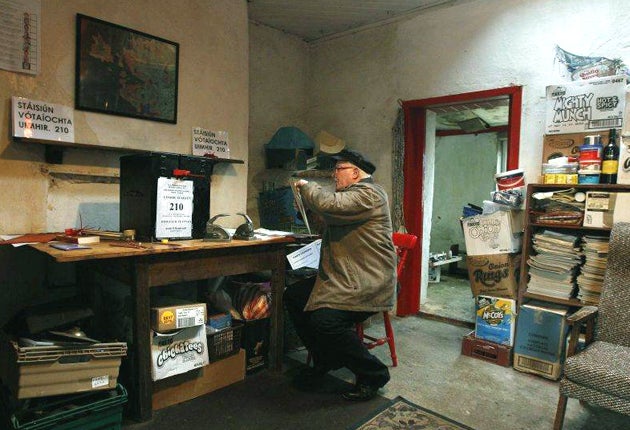Irish seek revenge at polls for financial fiasco
Voters furious about the state of the economy threaten to force Fianna Fail into meltdown

Your support helps us to tell the story
From reproductive rights to climate change to Big Tech, The Independent is on the ground when the story is developing. Whether it's investigating the financials of Elon Musk's pro-Trump PAC or producing our latest documentary, 'The A Word', which shines a light on the American women fighting for reproductive rights, we know how important it is to parse out the facts from the messaging.
At such a critical moment in US history, we need reporters on the ground. Your donation allows us to keep sending journalists to speak to both sides of the story.
The Independent is trusted by Americans across the entire political spectrum. And unlike many other quality news outlets, we choose not to lock Americans out of our reporting and analysis with paywalls. We believe quality journalism should be available to everyone, paid for by those who can afford it.
Your support makes all the difference.Fears for the future, a yearning for stability and a determination to exact political vengeance for the country's catastrophic finances are among the emotions swirling around an Irish election campaign as voters go to the polls today.
They will certainly be bringing about regime change. Fianna Fail is about to be unceremoniously booted from power, its policies having forced the country into receivership. Prime Minister Brian Cowen is leaving politics, while many other senior Fianna Fail figures are not standing again.
The palpable anger against the Fianna Fail-led government – illustrated by a satisfaction rating in single digits – exists alongside great concern about the economic prospects of both the country and its citizens. The Irish people are fretting, laden down with worries about personal debt, severe cuts, painful tax increases and the high unemployment which is causing increasing emigration among the young.
But even though politicians in general are held in low esteem, the Irish remain as interested as ever in politics: one party leaders' television debate was watched by almost a million viewers. Many, of course, are likely to have been shouting at their screens.
The prediction is that Fianna Fail faces meltdown and will go from more than 70 seats to perhaps two dozen, forfeiting its status as Ireland's centrally important political party to Fine Gael, the opposition party which has built a reputation for financial rectitude and restraint.
There will be days of counting before it is known whether the party can govern alone or will require support. During the campaign it has advanced steadily but unspectacularly in the opinion polls. The 38 per cent support it scored in recent polls means it will be close to an overall majority, but it may be a few seats short.
The phrase "steady but unspectacular" is a reasonable description of both the party and its leader, Enda Kenny, the prime minister in waiting. Fine Gael has always been the party of buttoned-up centre-right respectability, responsible to a fault. While many voters have often thought its old-fashioned virtues rather too sedate, a large number has now had enough of reckless Fianna Fail and will now settle for staid Fine Gael.
Fine Gael has run a steady and carefully planned campaign, realising from the start that, with Fianna Fail floundering, the most important point was to avoid slip-ups. It has also benefited greatly from the addition of a veteran heavyweight to its team. Michael Noonan, who in 2002 led the party to electoral disaster, has effectively discomfited the government.
When Fianna Fail cut benefits to third children for example, he produced laughter in parliament by asking plaintively: "Minister, what have you got against third children? Did some third child beat you up coming home from school as a young fella?"
At one point last year the Irish Labour party – which has a feisty leader in Eamon Gilmore – looked capable of overtaking Fine Gael, but the party faded during campaigning. Nevertheless, its 20 per cent support, combined with Fine Gael's 38 per cent, would provide a solid bloc in the Irish parliament should the latter fail to achieve an overall majority. Labour has thus lowered its sights to becoming a junior coalition partner.
The two parties have combined to form governments in the past, but the fact that one leans to the left and the other to the right has often caused in-built tensions.
Whatever the election outcome, the Irish habit is for parties to take their time to examine the results before opening negotiations on forming a government. If Fine Gael has no overall majority then it will open contacts with Labour, and possibly with independents, to explore the possibilities of parliamentary support.
It can very often take weeks to hammer out a deal in which the competing party election manifestos are reconciled. For example, both Fine Gael and Labour have said they will approach the EU and the International Monetary Fund to renegotiate parts of the international bailout of €85bn advanced to Dublin last year.
Labour has been more strident than Fine Gael in advocating this, while Fine Gael has been what might be termed more gentlemanly. The two approaches have to be made more compatible before a coalition deal is struck.
Whatever the election outcome, no one expects any easy solutions to Ireland's mountainous debt problem. The campaign has been characterised not by promises – no one would believe them – but by frank warnings of tough years ahead. Michael Noonan bluntly declared: "It's going to be dreadful."
Subscribe to Independent Premium to bookmark this article
Want to bookmark your favourite articles and stories to read or reference later? Start your Independent Premium subscription today.
Join our commenting forum
Join thought-provoking conversations, follow other Independent readers and see their replies
Comments